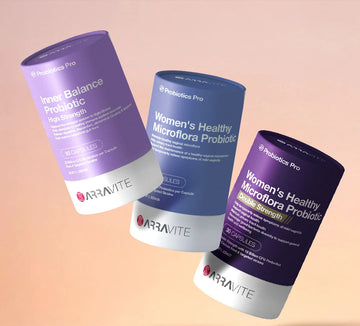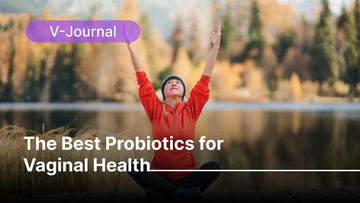As women, you often prioritize our careers, families, and countless responsibilities. But amidst the daily juggling, it’s easy to forget the essential aspects of your health, such as vaginal care. Ignoring vaginal health can have a serious issue, like frustrating the itch of a yeast infection and more. Vulvovaginal candidiasis (VVC) is the second most common cause of vaginal infections. It affects about 70–75% of women during their lifetime. (Source: Oxford University Press)
Therefore, you must understand your gut and vaginal health better. This article highlights the causes of vaginal health issues, ways to maintain vaginal hygiene and vaginal probiotics.
Why Does Vaginal Health Feel So Fragile?
Every system is intricate and interwoven in its unique way – the human body and the vaginal system are no different. Within the vagina, there exists a delicate ecosystem that functions on the principles of symbiosis:
- The Inner World of Bacteria: Your vagina is sensitive but has good bacteria, like lactobacilli, along with other germs. These good germs protect your vagina by keeping it balanced, around 3.8 to 4.5. They stop harmful germs from growing too much. Washing inside, antibiotics, or hormone changes can upset this balance, leading to infections and discomfort.
- The Impact of Hygiene: In an everyday scenario, even non-harmful acts can inadvertently alter the environment inside the vagina. A harsh soap, flowery clothing or overly fragrant products can highly irritate sensitive tissues and disrupt the natural pH, leaving one feeling worked out at the end of the day.
- Intimacy and its Influence: While sexual activity is an essential thing in one's life, it does come with its caveat of introducing new bacteria into the vagina. Broken flora makes one more vulnerable to infections and increases the chances of getting one.
- The Dance of Hormones: Hormones can be a tricky subject to talk about, considering menopause, menstruation, and pregnancy all have significant hormonal fluctuations. These changes can affect vaginal lubrication, PH acid levels, tissue health, and self-care needs.
10 Ways to Maintain Vaginal Hygiene & Health
Ten self-explanatory and yet powerful actions are shared below to encourage self-care to foster relish, relaxation, and care for women’s overall well-being alongside safety and self-confidence:
1. Embrace Gentle Cleansing
Soap, scented soaps, and douches should be replaced with warm water or, if required, a very gentle soap meant for intimate zones. Taking care of the external feminine parts requires outer vulva washing. Avoid further cleansing as it erodes the equilibrium provided by good bacteria.
2. Pat Dry with Kindness
Use a soft, clean towel to dab around the vulval area, but do not rub it. Never dry the vulval area using rough towels, as it can encourage skin discomfort and irritation. Avoid putting on undergarments like panties until the area is a hundred per cent dry to give room for air circulation, enabling the parts to dry completely to discourage the growth of bacteria.
3. Choose Breathable Comfort:
Cotton is good for your skin. It lets air in and keeps you dry. Don't wear nylon or spandex. These can trap sweat and germs. Change your underwear every day, mainly after you sweat.
4. Practice Safe Intimacy:
Make it a point to engage in safer sex by using protection. It prevents STIs. STIs are one of the significant virginal issues that drastically affect a woman’s body.
5. Wipe with Intention:
Wipe from front to back after using the restroom. This way, bacteria will not transfer from the anus to the vagina. Even though it does not take much concentration, this can be very helpful.
6. Say "No" to Douching:
Do not douche. Avoid douching, as it is unnecessary and can be harmful. Douching can cause an imbalance in the feminine flora, causing additional infections. It is now more important than ever to allow your body to self-clean.
7. Hydrate from Within:
Drinking large amounts of water preserves tissue health, including within the vaginal region. Hydration also eases the body’s natural lubrication while assisting with overall health.
8. Consider the Power of Probiotics:
Eating foods with probiotics can be good for you. They increase the good microbes in the vaginal area. Microflora vaginal probiotics can stop yeast infections and other problems. You can ask your doctor which types of probiotics are good for you.
What Are Probiotics?
Research on women's health often focuses on natural immunity and defences against infections. Probiotics refer to the good bacteria and microorganisms that benefit your health. Probiotics, primarily Lactobacillus species, are part of this natural system that you are gifted with. These microorganisms help prevent infections and sexually transmitted diseases and provide strong reproductive and digestive health.
Certain natural foods contain these beneficial microbes, like curd, yoghurt, and other fermented foods. These foods assist the growth of good bacteria (probiotics) that help your digestive and immune system. You can also use vaginal and gut probiotics supplements to assist the growth and strength of the beneficial microbe army.
9. Mindful Menstrual Care: Pay mindful attention to menstrual hygienic practices by routinely changing your pads, tampons, or cups to curb moisture and bacteria. As a recommended Practice, use products without fragrances. With tampons, make sure to choose ones that are neither too absorbent nor too dry.
10. Regular Check-Ins with Your Body and Doctor: Establish a wellness relationship with your healthcare provider, including regular visits to address any concerns, pre-empt problems, and ensure you receive the proper attention and care.
Arravite Inner Balance Vaginal Probiotic Supplement
Arravite’s Healthy Microflora Probiotic is a vaginal probiotic supplement. The tablets contain six types of Lactobacillus microbiomes to support vaginal health, including Lactobacillus rhamnosus and Lactobacillus Plantarum. These lactobacilli maintain a healthy vaginal microflora, support urinary tract health, and can temporarily relieve symptoms of mild vaginitis.
It is, however, recommended that you consult your healthcare professional for your dosage of probiotics. At Arravite, we are deeply committed to supporting women's health through natural and practical solutions. Thus, we provide high-quality supplements such as Inner Balance Probiotic for your inner body and promote overall well-being.
References: Paul Nyirjesy, Carolyn Brookhart, Gweneth Lazenby, Jane Schwebke, Jack D Sobel, Vulvovaginal Candidiasis: A Review of the Evidence for the 2021 Centers for Disease Control and Prevention of Sexually Transmitted Infections Treatment Guidelines, Clinical Infectious Diseases, Volume 74, Issue Supplement_2, 15 April 2022, Pages S162–S168, https://doi.org/10.1093/cid/ciab1057
Mei Z, Li D. The role of probiotics in vaginal health. Front Cell Infect Microbiol. 2022 Jul 28;12:963868. doi: 10.3389/fcimb.2022.963868. PMID: 35967876; PMCID: PMC9366906.






